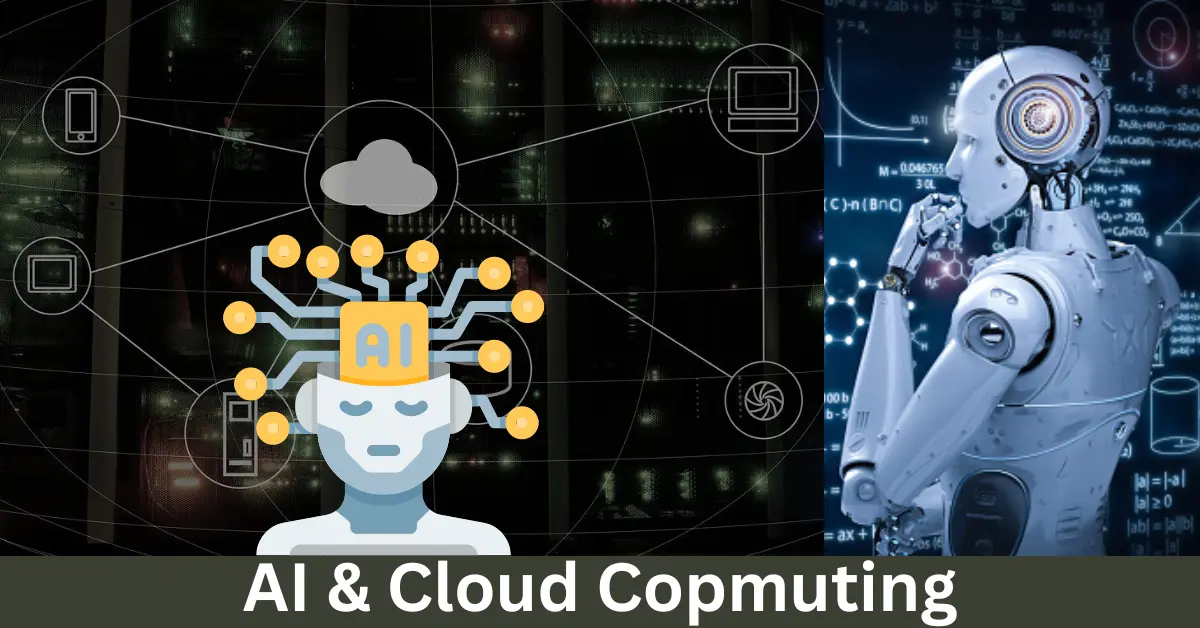AI and cloud computing are going to be an essential part of the business of the future. There is every expectation that cloud computing AI will play a significant role in the future of the cloud. It can be used to manage large data sets and process them quickly. Cloud computing helps in securely storing large amounts of data without requiring any upfront investment from all types of companies
The Role, Relationship & Benefits Of Using AI In Cloud Computing

The role of AI in Cloud Computing
The role of AI in cloud computing is to improve the efficiency and effectiveness of cloud-based services through the use of advanced algorithms and several machine learning techniques. This can include tasks such as automating the management of cloud resources, optimizing workloads, and providing insights into usage patterns.
The relationship between AI and Cloud Computing
The relationship between AI and cloud computing is that AI can be used to take advantage of the scalability, cost-effectiveness, and flexibility of cloud-based infrastructure to improve the performance and capabilities of AI applications.
The major benefits of using AI in Cloud Computing
The major benefits of using AI in cloud computing include increased efficiency and automation of cloud-based services, improved scalability and flexibility, and the ability to gain insights into usage patterns and optimize resource allocation. This can ultimately lead to cost savings and improved performance for small, medium large businesses and organizations using cloud-based services.
Is Cloud Computing Related To AI
Yes, cloud computing is related to AI. Cloud computing provides the infrastructure and services needed to build, train, and deploy AI models. It enables organizations to access powerful computing resources, such as GPUs and TPUs, which are necessary for training large and complex AI models.
Additionally, cloud computing platforms, such as Google Cloud, Amazon Web Services (AWS), and Microsoft Azure, offer a variety of AI services and tools, such as pre-trained models, machine learning frameworks, and data storage and processing services, that make it easier for developers to build, train, and deploy AI models.
Additionally, Cloud computing services such as Infrastructure as a Service (IaaS), Platform as a Service (PaaS), and Software as a Service (SaaS) provide the necessary resources for AI and ML to work seamlessly.
These resources include, storage, computation, and analytics capabilities to train and run the models, as well as access to the large and diverse data sets, which are crucial for AI models to learn and improve.
What Is the Role of AI in Cloud Computing
• The role of AI in cloud computing is to provide users with advanced capabilities for machine learning, data analytics, data analysis, data storage, and other forms of artificial intelligence through cloud-based services.
• Additionally, it allows organizations to leverage the scalability, flexibility, and cost-effectiveness of the cloud to access powerful AI technologies without the need to invest in expensive infrastructure or specialized expertise.
• Examples of AI in cloud computing include automation, natural language processing, image recognition, potential transformation, and predictive analytics. These services can be used to improve business operations, automate tasks, and derive insights from data.
• In addition to providing access to AI technologies, cloud computing also enables organizations to scale their AI capabilities as needed. This means that as the volume of data or the complexity of the AI models increases, the cloud infrastructure can automatically adjust to accommodate the additional resources required.
• Another important aspect of AI in cloud computing is that it allows for the development and deployment of machine learning models in a more efficient and cost-effective way.
• With cloud-based services, developers can easily access the compute resources and storage they need to train and deploy models, without having to worry about the underlying infrastructure. This can greatly reduce the time and cost associated with building and deploying AI models.
• Cloud providers also offer a wide range of pre-trained models and services, which can be used to quickly add AI functionality to a wide range of applications, such as voice recognition, image recognition and natural language processing.
• In addition, cloud computing enables the collaboration and sharing of data, models and resources among different organizations, leading to better insights, and faster progress in research and innovation.
Overall, AI in cloud computing provides a powerful set of tools for organizations to harness the power of artificial intelligence and machine learning, and to gain valuable insights from their data, all while leveraging the scalability and cost-effectiveness of the cloud.
The Benefits of AI in Cloud Computing
AI can bring several benefits to cloud computing, including:
1. Improved Automation:
AI can automate many tasks in cloud computing, such as provisioning resources, monitoring systems, and optimizing performance.
2. Better Scalability:
AI can help cloud providers more efficiently allocate resources to meet the changing demands of their customers.
3. Enhanced Security:
AI can help detect and prevent security breaches by identifying patterns of suspicious behavior in cloud environments.
4. Predictive Analytics:
AI can be used to analyze data and make predictions about future trends, which can help organizations make better decisions about how to use cloud resources.
5. Cost Savings:
AI can help organizations optimize the use of cloud resources, which can lead to cost savings.
6. Seamless Data Management
AI plays an important role in processing, managing, storing, and structuring data. Artificial intelligence technology can significantly improve business organizational departments by using more reliable real-time data. Ultimately, AI tools make it easier to obtain, modify, and manage data in a corrective, timely manner.
Overall, AI can help organizations make better use of cloud computing resources and improve the performance, security, and cost-effectiveness of their cloud environments.
What are the Challenges in Deploying AI in Cloud Environments
1. Data Privacy and Security:
Since AI models are trained on large amounts of data, ensuring the privacy and security of that data is a major concern. Organizations need to ensure that their data is properly protected and only authorized users have access to it.
2. Compliance:
Organizations must comply with a variety of legal and regulatory requirements when implementing AI, such as data protection rules, and ensuring that the model is not biased.
3. Latency:
Latency, or the delay in processing and transmitting data, can be a major issue when deploying AI in the cloud. This is especially true for real-time applications where low latency is important.
4. Cost:
The cost of running an AI model in the cloud can vary depending on the number of resources required, and organizations need to ensure they have a clear understanding of the costs involved.
5. Scalability:
AI models can require large amounts of compute resources, and organizations need to ensure that their cloud infrastructure can scale to accommodate the additional resources required.
6. Integration:
Integrating AI models with existing systems and processes can be challenging. Organizations need to ensure that the AI models they deploy can be easily integrated with their existing systems and workflows.
7. Model Management:
With the increasing number of models and usage, it is difficult to keep track of models and their versions, so it is important to have a good model management system to track models and their performance.
8. Interpretability:
With the increasing use of complex models, such as deep neural networks, it can be difficult to understand how the model is making its predictions. This can be a challenge when trying to explain the model’s results to others, or when trying to identify and correct errors in the model.
9. Human Supervision:
AI models are not perfect and can make mistakes, so it is important to have human supervision to monitor model performance and correct errors as needed.
Hence all organizations need to be aware of these challenges and take steps to mitigate them in order to successfully deploy AI in cloud environments.
Which Is Better Between AI and Cloud Computing
AI and cloud computing are different technologies and have different purposes.
• AI is focused on creating intelligent machines that can perform tasks that would typically require human intelligence, such as recognizing speech, understanding natural language, and making decisions.
• Cloud computing, on the other hand, is focused on providing on-demand access to computing resources, such as servers, storage, and software, over the internet.
• Both AI and cloud computing are important and can be used together to solve complex problems. For example, AI algorithms can be run on cloud-based infrastructure to provide scalable and cost-effective solutions. It’s not a matter of one being better than the other, they are two different technologies that can be used together to achieve great results.
• Today both AI and cloud computing are fast-growing technologies that are changing the way businesses and organizations operate.
• AI is being used in many applications, from natural language processing and image recognition to self-driving cars, space exploration and predictive analytics. On the other hand, cloud computing is making it easier for organizations to access, manage and expand their IT resources.
• One of the main advantages of using cloud computing for AI is that it allows organizations to take advantage of the scalability, cost-effectiveness, and flexibility of the cloud.
• With cloud computing, organizations can easily access powerful computing resources, such as GPUs, to train and run their AI models, without having to invest in expensive hardware. This makes it possible for smaller organizations and startups to compete with larger companies in terms of AI capabilities.
Final Thoughts: The Role, Relationship, and Benefits of Using AI in Cloud Computing
In conclusion, AI is becoming increasingly important in cloud computing as it can provide a range of benefits such as improved automation, better scalability, enhanced security, predictive analytics, and cost savings.
Organizations can use AI to optimize the use of cloud resources and improve the performance, security, and cost-effectiveness of their cloud environments.
This can lead to increased efficiency, better decision-making, and a competitive advantage for organizations.
As AI technology continues to advance, it will likely play an even more prominent role in cloud computing in the future.
• Also Read: What is Chat GPT-3

![How to Get Google Cloud Credits For Startups [Free] 2023 9 Google Cloud Credits For Startups](https://mywebshosting.com/wp-content/uploads/2021/04/google-cloud-credits-for-startups-1024x536.jpg)


